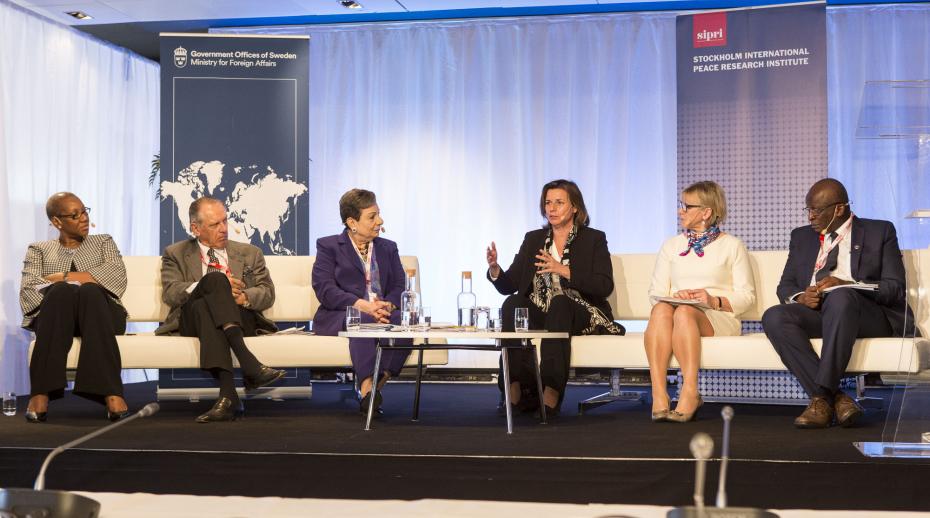
(Stockholm 3 May 2017): Today and tomorrow, over 200 high-level experts and policymakers gather in Stockholm to discuss ‘Sustaining Peace: What Works’ with the aim of applying successful peacebuilding tools to fragile and conflict-affected contexts.
This year’s Forum was opened by the Director of the Stockholm International Peace Research Institute (SIPRI), Dan Smith, who stressed the crucial relationship between peace and development. ‘The world is in an insecure situation and what we need is more commitment to achieving peace by peaceful means,’ he said.
Speaking at the opening session, Swedish Minister for Foreign Affairs, Margot Wallström, highlighted the need for practical action on peacebuilding, saying: ‘Asking ourselves what works is the honest recognition that we collectively need to redouble our efforts to build inclusive societies, prevent violent conflicts and build a sustained peace.’
Sierra Leonean Minister of Finance and Economic Development, Momodu Kargbo, spoke about the implementation of the UN Sustainable Development Goals and emphasized the need to translate and simplify them into a local context.
Swedish Minister of International Development Cooperation and Climate, Isabella Lövin, pointed to inclusivity as an example of what works in successful peacebuilding. ‘No country has left poverty without respecting and encouraging women’s rights’ she said.
Founder of the Madiba Institute for Leadership in West Africa, Oury Traoré, explained: 'Fragile states are resilient but the international community often speaks about the need to build capacity in fragile states as though it doesn't already exist. Donors should ask fragile states what they need to meet their goals.'
Former Deputy Secretary-General of the United Nations and incoming Chair of the SIPRI Governing Board Ambassador, Jan Eliasson, called for trusted and strong institutions, saying: ‘Institutions are the backbone of decent and civilized society.’
About SIPRI and the Stockholm Forum
The 2017 Stockholm Forum on Peace and Development enables interdisciplinary exchange among global thought leaders with the aim of influencing key policy and research agendas. It is co-hosted by SIPRI and the Swedish Ministry for Foreign Affairs.
SIPRI is an independent international institute dedicated to research into conflict, armaments, arms control and disarmament. Established in 1966, SIPRI provides data, analysis and recommendations, based on open sources.
The Ministry for Foreign Affairs is responsible for developing and implementing Sweden’s foreign policy. In addition to overseeing the operations of the country’s embassies and consulates, the Ministry for Foreign Affairs is responsible for Sweden’s development cooperation, trade and investment.
For editors
For media and photo requests, please contact SIPRI’s Director of Communications Stephanie Blenckner: blenckner@sipri.org, +46 8 655 97 47
- Forum sessions will be live-streamed on SIPRI’s YouTube channel
- General information about the 2017 Stockholm Forum
- Photos and videos will be made available throughout the Forum
- Follow SIPRI at the 2017 Forum on Twitter: @SIPRIorg #SthlmForum and Facebook